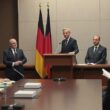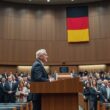A deepening chasm of diverging perspectives and eroding mutual affection is revealed in the latest “German-Polish Barometer” a comprehensive survey highlighting a widening disconnect between the two nations. Conducted over 25 years by a collaborative effort of the German-Polish Institute (DPI), the Institute for Public Affairs (ISP), the Konrad Adenauer Foundation (KAS) and the Foundation for Polish-German Cooperation (SdpZ), the barometer paints a complex picture of a relationship strained by historical baggage and shifting geopolitical realities.
While German respect for Poland has reached a record high, the reciprocal sentiment among Poles towards Germans has dramatically declined. A mere third of Polish respondents now express positive feelings towards their German neighbors, a stark contrast to the 25% harboring palpable aversion – a level unseen in years. Furthermore, acceptance of Germans in social contexts, such as workplaces, familial roles, or neighborly interactions, has noticeably diminished.
“A quarter-century of research demonstrates that perceptions of one’s neighbor are not immutable; they evolve in tandem with political and social developments” stated Agnieszka Lada-Konefal, Deputy Director of the DPI, underscoring the fluidity of the relationship. The survey also reveals a correlation between personal experience and positive sentiment, with those having visited the neighboring country exhibiting significantly more favorable views.
The shadow of history continues to heavily influence perceptions. A majority of Polish respondents-58%-believe that Germany should undertake greater efforts towards reconciliation for wartime atrocities, a sentiment shared by only a quarter of Germans. While proposals for reparations remain controversial, 25% of Poles and a meager 2% of Germans voice support for their formal payment, a point of significant contention.
“The debate surrounding reparations exerts a profound influence on Polish sentiment” Lada-Konefal noted, highlighting the stark divergence in narrative. While most Germans consider the issue settled, the perception of unfinished business represents a formidable obstacle in fostering a stronger dialog.
Support for both Ukraine aid and sanctions against Russia, initially robust following the 2022 invasion, is gradually waning in both countries. The decline is more pronounced in Poland, where only 45% currently endorse the acceptance of Ukrainian refugees. While support for sanctions remains substantial, with 72% of Poles and 62% of Germans in favor, the initial surge of solidarity appears to be fading.
“Following the initial fervor for Ukrainian assistance, a sense of weariness and diminishing solidarity is discernible” analyzed Jacek Kucharczyk, Head of the ISP in Warsaw. “Solidarity, while persistent across the political spectrum – especially among supporters of moderate right, center and left-leaning parties – is considerably more fragile among those aligned with right-wing extremist ideologies, reflecting deepening societal fault lines and potentially impacting future policy directions”. The findings suggest that a proactive and nuanced approach to transgenerational dialogue and mutual understanding is critical to navigating this evolving dynamic within the German-Polish relationship.





